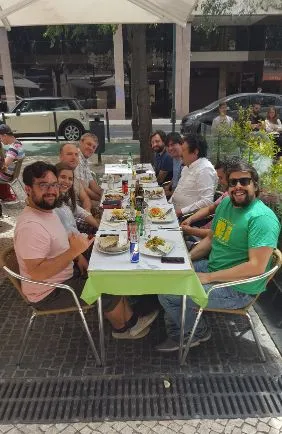The two of us - Malcolm Sparks and Jon Pither - have just spent a thoroughly enjoyable week in Lisbon providing full stack Clojure training. It was a pleasure to see the start of a promising Clojure scene in Portugal’s capital, one that we hope will flourish in the years to come.
We eased into the course of eight attendees with a Clojure Kata - pulling back some interesting JSON from a public API and transforming it to answer some basic queries. This involved using the REPL and Clojure’s sequence library to great effect.
For the duration of the course, we built upon our Edge project, which is a Clojure bootstrapped project containing the libraries we favor and a working web application example linked up to Datomic.

We had a range of different operating systems and IDEs to contend with. There were no users of Arch Linux on this course - which is what we use at JUXT - instead, we had some Macs and a Windows environment in play. We were able to get moving in Windows by installing Git Bash and from there boot-clj, which is the build system we use for Edge.
Once everyone had their IDEs and REPLs in full swing and the Kata was completed, we then started to move through the full-stack syllabus.
During the two days, we went through the following, using a mix of exercise-based learning and discovery via live coding.
-
Web routes with Bidi
-
Secure APIs with Yada
-
An SPA (single page application) using Reagent
-
Updating the SPA data model using server-sent events produced by Yada
-
An introduction to Datomic
The participants were excellent and swiftly got up to speed with the course material. We regularly solicited and received feedback throughout the course to balance the mix of live coding and exercises to ensure that we maintained traction as we moved through the advanced topics.
Whilst it was an intensive two days, we were able to take the participants through the syllabus so that hopefully, they should be able to start using the various technologies for their next Clojure project.
Aside from training, we both had a lovely time in Lisbon. We were told by various people (a taxi driver, hotel manager, and course attendees) to visit the restaurant Ramiro for exemplary Portuguese sea food. We can report that the shellfish was mind-blowingly good.

We wandered into the Old Town for a cocktail, and visited the Timeout market to try some more Portugese national dishes.
Aside from the food - of which we hopefully did justice - Lisbon is a beautiful city. We spent hours walking around and enjoying the vibe, and we would love to return. If you’re thinking of a trip to Lisbon - go there.







